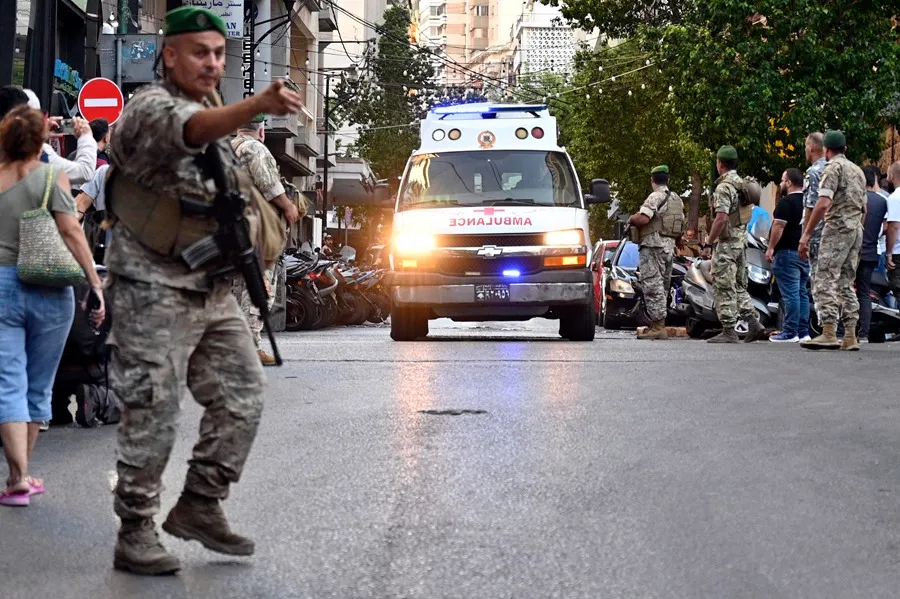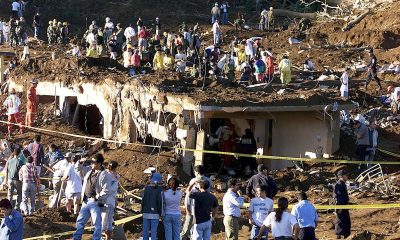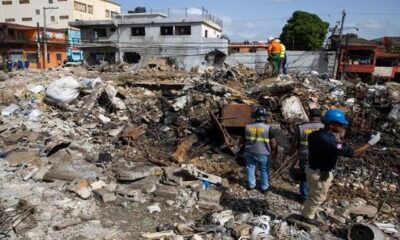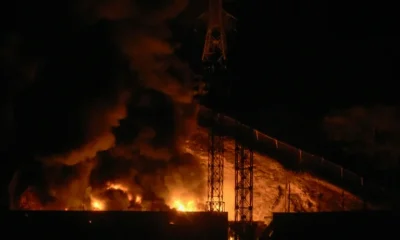International
Manipulated ‘you’ searches’ and a fake message: what is known about the explosions in Lebanon

A new shipment of search devices used by members of the Lebanese Shiite group Hezbulá, originally manipulated before arriving in Lebanon, and a false message that detonated them remotely are the most likely hypotheses of the chain of explosions that this Tuesday caused at least twelve deaths in an operation attributed to Israel.
According to various sources, and in the absence of knowing the exact details, including who was the author of that cyber attack that from Lebanon is attributed to Israel, the Lebanese Minister of Telecommunications, Johnny Corn, assures that the devices that exploded were part of a shipment that “recently” arrived” in Lebanon.
He states that “maybe it was activated remotely,” although he does not yet know how, and indicates that, according to preliminary information, “the batteries of the people seekers heated up.”
It may, therefore, that even some people threw away those devices before they exploded.
This is what is known so far about this unusual and sophisticated operation:
Since the simultaneous attack, which injured thousands of people, including the Iranian ambassador to Lebanon, Mojtaba Amani, and which affected members of the Shii armed formation in Syria, there have been numerous hypotheses about how this attack could have occurred.
The most likely, and that some experts are already pointing out, such as the military analyst and independent politician, Elijah J. Magnier, is that an explosive trap was placed inside the devices, which “were not imported directly to Lebanon, but were stopped in a nearby country for three months, where Israel implanted the explosive.”
In what would be a sophisticated infiltration in the supply chain of these devices, Israel would have placed the explosives in that batch of devices, in total about 3,000, according to several US media, including The New York Times, always citing anonymous sources.
These explosives would have been implanted next to the battery of each of the mensaphones, which is why there was an overheating prior to the explosion, to which a mechanism was added to detonate them remotely.
That mechanism was a false message, which supposedly came from the dome of Hezbulá, and that when punctured activated the explosives.
Before the detonation, according to the sources, the device was programmed to beep for several seconds.
This type of attacks on supply chains is a concern in the field of cybersecurity due to the potential ‘hacks’ that may occur in the development phases, although these actions are normally limited to software and not to hardware, since for the latter it is required to have accessed the device during the assembly line.
Several computer experts consulted by EFE support the theory that, for these explosions to occur, the devices would have to have been manipulated at origin or destination, pointing out that the manufacturers of the components of these mensaphones are the ones who should respond to this.
And they have done so, since according to the New York Times, Hizbulá commissioned the devices from the Taiwanese company Gold Apollo.
However, the Asian company denied in a statement having manufactured these devices and indicated that the person responsible for producing them is a company called ‘BAC’, which is based in Budapest.
Regarding the AR-924 ‘person-seeker’ that would have been used in the explosions, the Taiwanese company reiterates that it is a model “produced and sold” by BAC.
“We only provide the authorization of the registered trademark and we are not involved in the design or manufacture of this product. We always adhere to the relevant regulations and maintain a transparent and compliant cooperation with our partners,” the statement concluded.
The Shiite group uses among its members this kind of devices as a means of communication to avoid being geolocated by Israel, which usually carries out selective murders against members of Hezbullah, among other factions present in Lebanon and Syria.
Mensaphones, which became obsolete with the arrival of the mobile phone, are low-tech wireless devices that basically receive alphanumeric and bidirectional messages, with the ability to send and receive short messages.
International
U.S. to suspend visa processing for applicants from 75 countries

The United States announced on Wednesday that it will suspend visa processing for applicants from 75 nationalities, marking another move by President Donald Trump’s administration to curb the entry of migrants into the country.
“ The United States is freezing the processing of all visas for 75 countries, including Somalia, Russia and Iran,” White House Press Secretary Karoline Leavitt wrote on X. According to Fox News, the measure will take effect on January 21 and will remain in force indefinitely.
Based on an internal State Department memorandum obtained by Fox News Digital, consular officers have been instructed to deny visa applications under existing law while the agency conducts an in-depth review of screening and vetting procedures. The stated goal is to tighten criteria to prevent the entry of foreigners who could eventually rely on public assistance.
The list of affected countries includes several nations in Latin America and the Caribbean, as well as Afghanistan, Russia, Iran, Iraq, Egypt, Nigeria, Thailand, Somalia and Yemen, among others. Fox News reported that exemptions to the suspension will be “very limited” and will only be granted once applicants pass an assessment related to the public charge requirement.
Other countries in the Americas subject to the suspension include Antigua and Barbuda, the Bahamas, Barbados, Belize, Cuba, Dominica, Grenada, Guatemala, Haiti, Jamaica, Nicaragua, Saint Kitts and Nevis, Saint Lucia, and Saint Vincent and the Grenadines.
The decision is based on a strict interpretation of the so-called “public charge” clause of U.S. immigration law. A cable sent to U.S. consulates worldwide in November 2025 had already signaled the shift, instructing officials to apply tougher standards when evaluating applicants, taking into account factors such as age, health status, English proficiency, financial situation, history of public assistance, and even the potential need for long-term medical care.
International
Peruvian Court Orders Definitive Dismissal of Money Laundering Case Against Keiko Fujimori

A court of Peru’s National Superior Court of Specialized Criminal Justice ordered the definitive dismissal of the criminal proceedings for alleged money laundering and criminal organization against presidential candidate Keiko Fujimori, authorities reported on Tuesday, January 13, 2026.
The ruling was issued by the Tenth National Preparatory Investigation Court in compliance with a previous decision by the Constitutional Court (TC). The decision was confirmed by Fujimori’s attorney, Giuliana Loza, who said on social media platform X that “there was no money laundering nor criminal organization.”
According to the defense, the case was closed for lacking legal grounds and for violating due process. “The proceedings concluded because they lacked a legal basis and constituted clear prosecutorial persecution,” Loza stated.
Judge Wilson Verastegui, whose ruling was reported by local media, said the Constitutional Court determined that the facts alleged in the so-called ‘Cocktails Case’ do not constitute a criminal offense under the principle of legality. The court noted that the crime of illegal financing of political organizations was not in force at the time the alleged acts occurred.
The dismissal also applies to other leaders of the Fuerza Popular party, including Pier Figari, Ana Rosa Herz, Jaime Yoshiyama and José Chlimper, as well as the party itself.
Keiko Fujimori, daughter of former president Alberto Fujimori (1990–2000), had been under investigation for the alleged irregular financing of her 2011 and 2016 presidential campaigns, a case that exposed her to a possible 30-year prison sentence. However, one year ago the National Superior Court annulled the trial and returned the case to the intermediate stage.
Fujimori is currently pursuing her fourth presidential bid, ahead of Peru’s general elections scheduled for April.
International
Colombian Defense Chief Meets U.S. Officials to Advance Bilateral Narcotics Strategy

Colombia’s Minister of Defense, Pedro Sánchez Suárez, is in the United States this Tuesday and Wednesday to discuss bilateral cooperation in the fight against drug trafficking, Colombian officials said, in a visit that comes as ties between Bogotá and Washington begin to ease after a period of diplomatic tension.
The trip is seen as a prelude to a scheduled visit by Colombian President Gustavo Petro to Washington, where he is expected to meet U.S. President Donald Trump for the first time in early February. Sánchez will remain in Washington through Wednesday, according to Colombian government sources.
During his stay, Sánchez is slated to meet with senior U.S. officials, including representatives from the Department of Defense, members of the U.S. Senate, and White House advisors, to outline a joint strategy to “defeat drug trafficking” and expand cooperation on intelligence against transnational crime.
According to a statement from the Colombian Defense Ministry, the agenda will include strengthening collaboration on technology, intelligence sharing, and efforts to disrupt criminal networks that operate across borders. Officials said the discussions will also help set the stage for Petro’s upcoming talks with Trump.
The visit follows a period of strained U.S.–Colombia relations last year, when Washington revoked Petro’s visa and withdrew Colombia’s certification as a key partner in anti-drug efforts — moves that coincided with disagreements over counter-narcotics strategy and broader diplomatic frictions. However, a recent phone call between Petro and Trump, described as cordial by officials, helped lower tensions and reopened channels for dialogue ahead of the presidential meeting.
-

 International2 days ago
International2 days agoDeadly van accident near Brazil border leaves 11 dead in Bolivia
-

 Central America2 days ago
Central America2 days agoTaiwan’s $10 million donation after 2001 earthquakes allegedly diverted in El Salvador
-

 Central America2 days ago
Central America2 days agoU.S. and El Salvador maintain close partnership, embassy says
-

 International2 days ago
International2 days agoDominican court postpones hearing in deadly nightclub collapse case
-

 International2 days ago
International2 days agoU.S. to host Danish and Greenlandic Foreign Ministers at the White House
-

 International2 days ago
International2 days agoPolice hunt gunmen after fatal shooting in Corsica
-

 International2 days ago
International2 days agoEx-President accused of bid to establish dictatorship as verdict nears in South Korea
-

 International2 days ago
International2 days agoVenezuelan opposition leader dedicates Nobel Prize to Trump
-

 International5 days ago
International5 days agoU.S. strike in Caracas killed 32 cuban security officers, experts say surprise was crucial
-

 International4 days ago
International4 days agoU.S. Issues Urgent Evacuation Call for Citizens in Venezuela
-

 International21 hours ago
International21 hours agoColombian Defense Chief Meets U.S. Officials to Advance Bilateral Narcotics Strategy
-

 Central America13 hours ago
Central America13 hours agoBukele warns crime can become a ‘parallel government’ during visit to Costa Rica
-

 International21 hours ago
International21 hours agoPeruvian Court Orders Definitive Dismissal of Money Laundering Case Against Keiko Fujimori
-

 International12 hours ago
International12 hours agoU.S. to suspend visa processing for applicants from 75 countries


























